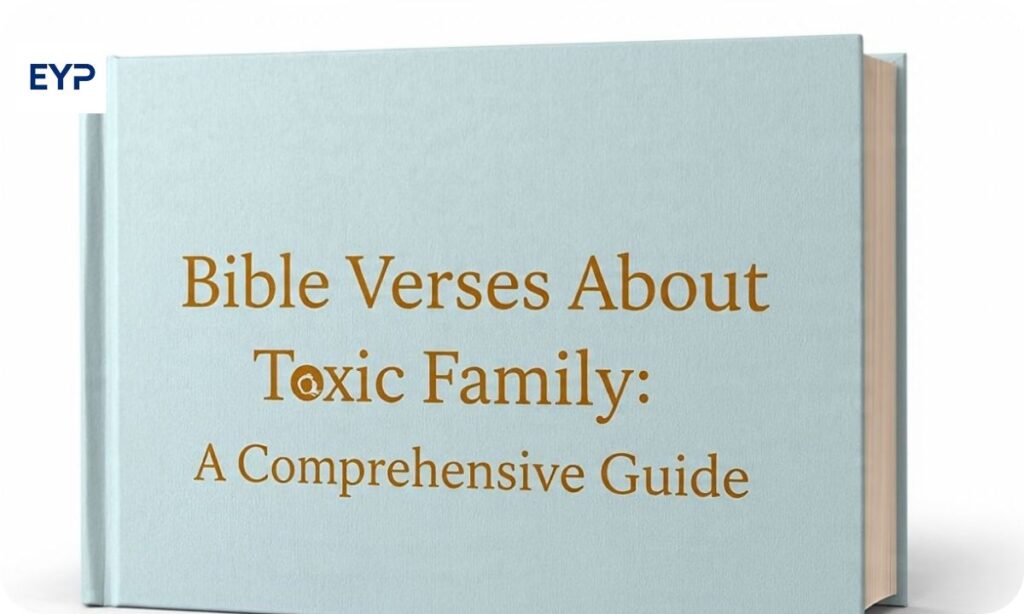Family should be our safe place. But sometimes family members hurt us deeply. They might use harsh words, manipulate our feelings, or make us feel worthless. When family relationships become harmful and toxic, we need God’s wisdom.
The Bible doesn’t ignore these painful situations. Instead, it offers hope and practical guidance for dealing with difficult family members. We can find comfort knowing that God understands our struggles.
Understanding Toxicity
1. Matthew 10:34-36
“Do not think that I have come to bring peace to the earth. I have not come to bring peace, but a sword. For I have come to set a man against his father, and a daughter against her mother, and a daughter-in-law against her mother-in-law. And a person’s enemies will be those of his own household.”
This passage from Jesus’ teachings is both sobering and validating. Christ himself acknowledged that following truth and righteousness can create division within families.
This verse doesn’t celebrate family conflict but honestly addresses the reality that sometimes our closest relationships become sources of opposition.
2. Proverbs 22:10
“Drive out a scoffer, and strife will go out, and quarreling and abuse will cease.”
The wisdom literature of Proverbs offers practical insight into dealing with difficult people, including family members who consistently create chaos.
A “scoffer” is someone who mocks wisdom, rejects correction, and creates ongoing conflict. This verse suggests that sometimes the only way to restore peace is to remove the source of constant turmoil.
3. Galatians 5:19-21
“Now the works of the flesh are evident: sexual immorality, impurity, sensuality, idolatry, sorcery, enmity, strife, jealousy, fits of anger, rivalries, dissensions, divisions, envy, drunkenness, orgies, and things like these. I warn you, as I warned you before, that those who do such things will not inherit the kingdom of God.”
Paul’s list of destructive behaviors provides a clear framework for identifying toxicity in relationships. Many of these characteristics—anger, strife, jealousy, divisions, envy—are common in toxic family dynamics.
When family members consistently exhibit these behaviors, it creates an atmosphere contrary to God’s design for healthy relationships. This passage helps us recognize that certain behaviors are inherently destructive and incompatible with spiritual health and emotional well-being.
4. Romans 12:18
“If possible, so far as it depends on you, live peaceably with all.”
This verse acknowledges a crucial limitation in our ability to create peace in relationships. Paul includes the phrase “if possible” because he understood that peace isn’t always achievable, regardless of our efforts.
The phrase “so far as it depends on you” emphasizes personal responsibility while recognizing that we cannot control others’ actions or responses.
5. Proverbs 14:7
“Leave the presence of a fool, for there you do not meet words of knowledge.”
Biblical wisdom distinguishes between those who are teachable and those who consistently reject wisdom. A “fool” in biblical terminology isn’t someone lacking intelligence but someone who rejects wise counsel and persists in harmful behavior.
This verse advises physical and emotional distance from such individuals because their influence is spiritually and emotionally unproductive. In family contexts, this might mean limiting deep conversations, seeking advice elsewhere, or reducing time spent with family members who consistently display foolish behavior.
6. Ephesians 4:31-32
“Let all bitterness and wrath and anger and clamor and slander be put away from you, along with all malice. Be kind to one another, tenderhearted, forgiving one another, as God in Christ forgave you.”
This passage outlines both what to avoid and what to embrace in relationships. While it calls for forgiveness and kindness, it also clearly states that bitterness, anger, slander, and malice should be “put away.”
This applies both to our own behavior and to what we accept from others. We can forgive family members who have hurt us while still refusing to tolerate ongoing abusive behavior. Forgiveness doesn’t require continued exposure to harm.
7. Psalm 26:4-5
“I do not sit with men of falsehood, nor do I consort with hypocrites. I hate the assembly of evildoers, and I will not sit with the wicked.”
The psalmist David models healthy boundary-setting by clearly stating his refusal to associate with those who practice deception and wickedness. This isn’t hatred toward individuals but rather a principled stance against toxic behavior patterns.
In family relationships, this might translate to refusing to participate in gossip, manipulation, or other destructive family dynamics, even when such participation is expected or demanded.
8. 2 Timothy 3:2-5
“For people will be lovers of self, lovers of money, proud, arrogant, abusive, disobedient to their parents, ungrateful, unholy, heartless, unappeasable, slanderous, without self-control, brutal, not loving good, treacherous, reckless, swollen with conceit, lovers of pleasure rather than lovers of God, having the appearance of godliness, but denying its power. Avoid such people.”
Paul provides a comprehensive description of toxic personality traits and clearly instructs believers to avoid such individuals. The command “avoid such people” doesn’t make exceptions for family relationships.
This passage validates the wisdom of distancing ourselves from family members who consistently display these characteristics, even when cultural or familial pressure demands continued close relationships.
9. 1 Corinthians 15:33
“Do not be deceived: ‘Bad company ruins good morals.'”
Paul warns that prolonged exposure to negative influences inevitably affects our own character and behavior. This principle applies particularly to family relationships where emotional bonds and established patterns make us vulnerable to adopting unhealthy behaviors or accepting treatment we would reject from others.
Recognizing this vulnerability is the first step in protecting ourselves from the corrupting influence of toxic family dynamics.
10. Luke 12:51-53
“Do you think that I have come to give peace on earth? No, I tell you, but rather division. For from now on in one house there will be five divided, three against two and two against three. They will be divided, father against son and son against father, mother against daughter and daughter against mother, mother-in-law against her daughter-in-law and daughter-in-law against mother-in-law.”
Jesus explicitly acknowledged that his teachings would create division within families. This passage validates the experience of those whose commitment to healthy principles creates conflict with family members who prefer dysfunction or manipulation.
Christ’s words normalize the reality that sometimes spiritual and emotional growth requires accepting family disapproval or rejection.
Setting Boundaries

1. Matthew 18:15
“If your brother sins against you, go and tell him his fault, between you and him alone. If he listens to you, you have gained your brother.”
Jesus provides a clear model for addressing harmful behavior in relationships. The first step is direct, private communication about the problem. This approach shows respect for the relationship while clearly identifying unacceptable behavior.
In toxic family situations, this might involve having honest conversations about how specific behaviors affect you and what changes are needed for the relationship to continue healthily.
2. 1 Corinthians 5:11
“But now I am writing to you not to associate with anyone who bears the name of brother if he is guilty of sexual immorality or greed, or is an idolater, reviler, drunkard, or swindler—not even to eat with such a one.”
Paul instructs the church to maintain distance from those who claim to be believers but persist in destructive behavior. The phrase “not even to eat with such a one” indicates complete social separation when necessary.
Applied to family relationships, this validates the wisdom of limiting or ending contact with family members whose behavior is consistently harmful, regardless of their claims to love or good intentions.
3. Titus 3:10
“As for a person who stirs up division, after warning him once and then twice, have nothing more to do with him.”
This verse provides a clear protocol for dealing with divisive individuals. After two warnings, Paul instructs believers to cease association.
This approach prevents endless cycles of confrontation and establishes clear consequences for continued harmful behavior. In family contexts, it means we don’t have to tolerate ongoing division and drama indefinitely.
4. Proverbs 23:9
“Do not speak in the hearing of a fool; he will despise the good sense of your words.”
This wisdom recognizes that some people are not receptive to reason or good counsel. Attempting to share wisdom with such individuals often results in ridicule or rejection.
In toxic family relationships, this translates to avoiding deep sharing, seeking advice, or attempting to reason with family members who consistently dismiss or mock our perspectives and values.
5. 1 Timothy 6:5
“And constant friction among people who are depraved in mind and deprived of the truth, imagining that godliness is a means of gain.”
Paul identifies “constant friction” as a characteristic of relationships with certain types of people. This validates the exhausting nature of toxic family relationships where conflict is ongoing and resolution seems impossible.
The verse suggests that sometimes the constant friction itself is evidence that the relationship dynamic is unhealthy and may require different boundaries.
6. Proverbs 4:14-15
“Do not enter the path of the wicked, and do not walk in the way of evil. Avoid it; do not go on it; turn away from it and pass on.”
The language here is emphatic: avoid, do not go, turn away, pass on. This strong directive applies to situations and relationships that consistently involve harmful or destructive patterns.
In family contexts, this might mean refusing to participate in family gatherings where abuse occurs, avoiding conversations that inevitably become toxic, or declining to engage in family patterns that compromise our well-being.
7. 2 Corinthians 6:14
“Do not be unequally yoked with unbelievers. For what partnership has righteousness with lawlessness? Or what fellowship has light with darkness?”
While often applied to marriage, this principle extends to any close partnership or deep emotional connection. Paul highlights the fundamental incompatibility between those committed to righteousness and those who persist in harmful behavior.
In family relationships, this might mean limiting emotional intimacy with family members whose values and behaviors are consistently contrary to healthy principles.
8. Proverbs 18:1
“Whoever isolates himself seeks his own desire; he breaks out against all sound judgment.”
This verse provides important balance by warning against complete isolation. While setting boundaries is necessary, completely cutting ourselves off from all relationships is unhealthy.
The key is discerning the difference between healthy boundaries and unhealthy isolation, maintaining connections with people who are safe while limiting exposure to those who are harmful.
9. James 4:7
“Submit yourselves therefore to God. Resist the devil, and he will flee from you.”
James connects spiritual submission with resistance to evil influences. This verse empowers us to actively resist toxic patterns and harmful influences, including those within family relationships.
The promise that evil “will flee” when resisted provides hope that consistent boundary-setting can lead to positive change in family dynamics.
10. 2 Thessalonians 3:14-15
“If anyone does not obey what we say in this letter, take note of that person, and have nothing to do with him, that he may be ashamed. Do not regard him as an enemy, but warn him as a brother.”
Paul provides nuanced guidance for handling difficult relationships. While advocating for distance (“have nothing to do with him”), he also emphasizes maintaining a heart of love (“warn him as a brother”).
This approach allows for firm boundaries while preserving hope for eventual restoration of the relationship.
Healing and Moving Forward
1. Psalm 147:3
“He heals the brokenhearted and binds up their wounds.”
This beautiful promise acknowledges that toxic family relationships create real wounds that require healing. God specializes in mending broken hearts and addressing the deep emotional injuries caused by family dysfunction.
This verse offers hope that recovery is possible and that God is actively involved in our healing process.
2. Isaiah 41:10
“Fear not, for I am with you; be not dismayed, for I am your God; I will strengthen you, I will help you, I will uphold you with my righteous right hand.”
God’s promise of presence, strength, help, and support provides the foundation for healing from toxic family relationships.
The fear and dismay that often accompany difficult family situations can be countered by confidence in God’s active involvement in our lives and circumstances.
3. 2 Corinthians 1:3-4
“Blessed be the God and Father of our Lord Jesus Christ, the Father of mercies and God of all comfort, who comforts us in all our affliction, so that we may be able to comfort those who are in any affliction, with the comfort with which we ourselves are comforted by God.”
This passage reveals that our experiences with toxic family relationships, while painful, can become sources of ministry and help for others facing similar struggles.
God’s comfort in our affliction equips us to extend that same comfort to others, giving meaning and purpose to our pain.
4. 1 Peter 5:7
“Casting all your anxieties on him, because he cares for you.”
The anxiety and worry that accompany toxic family relationships can be overwhelming. Peter encourages us to actively transfer these burdens to God, who genuinely cares about our well-being.
This verse provides both permission and instruction for releasing the emotional weight of difficult family relationships.
5. Romans 8:28
“And we know that for those who love God all things work together for good, for those who are called according to his purpose.”
Even the painful experiences of toxic family relationships can be used by God for good purposes in our lives.
This doesn’t minimize the pain or justify the harmful behavior, but it provides hope that our suffering won’t be wasted and that God can bring positive outcomes from negative circumstances.
6. Philippians 4:6-7
“Do not be anxious about anything, but in everything by prayer and supplication with thanksgiving let your requests be made known to God.
And the peace of God, which surpasses all understanding, will guard your hearts and your minds in Christ Jesus.”
Paul provides a practical antidote to the anxiety that often accompanies toxic family relationships.
Through prayer, supplication, and thanksgiving, we can experience God’s supernatural peace that guards our hearts and minds from the turmoil of difficult relationships.
7. Jeremiah 29:11
“For I know the plans I have for you, declares the Lord, plans for welfare and not for evil, to give you a future and a hope.”
God’s plans for our lives include welfare, future, and hope—even when our family relationships are sources of pain and disappointment.
This verse reassures us that our identity and future aren’t determined by family dysfunction but by God’s good plans for our lives.
8. Psalm 34:18
“The Lord is near to the brokenhearted and saves the crushed in spirit.”
David’s words validate the deep emotional pain that toxic family relationships can cause while affirming God’s special closeness to those who are suffering.
The promise of salvation for the “crushed in spirit” offers hope for recovery and restoration.
9. 2 Chronicles 7:14
“If people who are called by my name humble themselves, and pray and seek my face and turn from their wicked ways, then I will hear from heaven and will forgive their sin and heal their land.”
While often applied to nations, this principle of seeking God’s face and turning from destructive patterns applies to personal and family healing as well.
Our own humility, prayer, and repentance can contribute to healing in family relationships, even when others aren’t willing to participate in the process.
10. Proverbs 3:7-8
“Be not wise in your own eyes; fear the Lord, and turn away from evil. It will heal your flesh and refresh your bones.”
The path to healing involves both reverence for God and active rejection of evil influences and behaviors.
This verse promises that following God’s wisdom and distancing ourselves from harmful patterns will result in personal healing and refreshment.
Conclusion
Dealing with toxic family relationships is one of life’s most challenging experiences. The emotional complexity of loving people who hurt us, the guilt that accompanies boundary-setting with family members, and the grief of accepting that some relationships may never be healthy create a unique form of suffering.
However, the Bible offers both validation for these struggles and practical wisdom for navigating them.The scriptures teach us that toxicity is real and that God doesn’t require us to tolerate ongoing harm in the name of family loyalty. We can love family members while refusing to accept abusive behavior.






![The 200+BEST Smile Captions for Instagram [2025 List]](https://eypmeaning.info/wp-content/uploads/2025/10/The-200BEST-Smile-Captions-for-Instagram-2025-List-150x150.jpg)